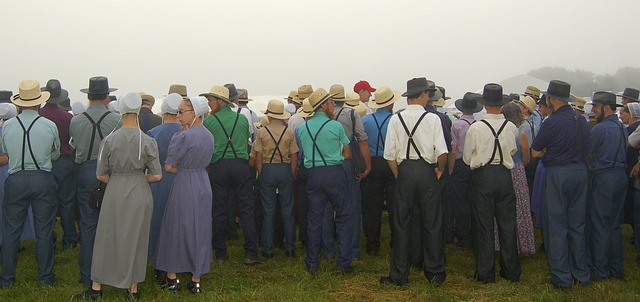The Amish are a religious group known for their traditional way of life and strong emphasis on family values. One question that often arises is whether Amish individuals marry their relatives.
Table of Contents
The Tradition of Endogamy in Amish Marriages
Do Amish marry their relatives? It’s a question that often comes up when discussing the Amish community and their unique way of life. The Amish are known for their strict adherence to traditional values and customs, and marriage is no exception. In fact, the Amish practice a form of endogamy, which means they prefer to marry within their own community.
Endogamy has been a long-standing tradition among the Amish, dating back to their origins in Europe. The practice of marrying within the community helps to maintain their distinct cultural identity and preserve their way of life. It also serves as a way to strengthen social ties and maintain a sense of unity among the Amish people.
One reason for the practice of endogamy is the belief in the importance of shared values and beliefs. By marrying within the community, the Amish ensure that their spouse will share their religious beliefs, cultural practices, and way of life. This helps to create a strong foundation for a successful marriage and a harmonious family life.
Another reason for endogamy is the desire to keep the Amish community small and close-knit. The Amish believe that a smaller community allows for stronger social bonds and a greater sense of community. By marrying within the community, they can ensure that their population remains relatively small and that everyone knows each other. This fosters a sense of belonging and support within the community.
Endogamy also helps to maintain a sense of cultural continuity among the Amish. By marrying within the community, they can pass down their traditions, customs, and language to future generations. This ensures that their way of life will be preserved for years to come.
While endogamy is the preferred practice among the Amish, it is not a strict requirement. Some Amish individuals do choose to marry outside of the community, although this is relatively rare. When an Amish person does marry outside of the community, it can sometimes lead to tensions and challenges as they navigate the differences in lifestyle and beliefs.
In recent years, there has been some debate within the Amish community about the practice of endogamy. Some argue that marrying outside of the community can bring new perspectives and ideas, enriching the Amish way of life. Others worry that it could dilute their cultural identity and lead to a loss of traditions.
Ultimately, the decision to marry within the community or outside of it is a personal one for each Amish individual. It is a choice that is influenced by their own beliefs, values, and desires for their future. Regardless of their decision, the Amish community remains strong and united, bound together by their shared history, faith, and way of life.
So, do Amish marry their relatives? While the Amish practice endogamy and prefer to marry within their own community, it is not a strict requirement. The practice of endogamy helps to maintain their cultural identity, strengthen social ties, and preserve their way of life. However, some Amish individuals do choose to marry outside of the community, although this is relatively rare. Ultimately, the decision to marry within or outside of the community is a personal one, influenced by individual beliefs and desires.
Understanding the Genetic Consequences of Amish Marriages

Do Amish marry their relatives? It’s a question that often comes up when discussing the Amish community and their unique way of life. The Amish are known for their strict adherence to traditional values and customs, and one of those customs is the practice of marrying within their own community. But does this mean that they marry their relatives?
To understand the answer to this question, it’s important to first understand the genetic consequences of Amish marriages. The Amish community is relatively small, with only around 300,000 members in the United States. This means that there is a limited pool of potential partners within the community, which can lead to a higher likelihood of intermarriage.
Intermarriage, or the practice of marrying within a specific group or community, has been a common practice throughout history. It is often done to preserve cultural or religious traditions, as well as to maintain social and economic ties within a community. In the case of the Amish, intermarriage is seen as a way to preserve their unique way of life and ensure the continuation of their traditions.
However, intermarriage can also have genetic consequences. When individuals who are closely related marry and have children, there is an increased risk of genetic disorders and other health issues. This is because closely related individuals are more likely to carry the same recessive genes, which can increase the likelihood of these genes being expressed in their offspring.
In the case of the Amish, intermarriage has led to a higher incidence of certain genetic disorders within their community. One example is a condition called Ellis-van Creveld syndrome, which is characterized by short stature, extra fingers or toes, and heart defects. This condition is more common among the Amish population due to the practice of intermarriage.
Despite these genetic consequences, the Amish community continues to practice intermarriage as a way to preserve their way of life. They believe that the benefits of maintaining their traditions and cultural identity outweigh the potential risks of genetic disorders. Additionally, the Amish community has developed a strong support system to help individuals and families affected by genetic disorders, providing medical care and other resources to those in need.
It’s important to note that not all Amish individuals marry their relatives. While intermarriage is a common practice within the community, there are also opportunities for individuals to marry outside of the Amish community. This can happen when an individual chooses to leave the community or when an outsider is accepted into the community through conversion.
In conclusion, the Amish community does practice intermarriage as a way to preserve their traditions and way of life. This practice can have genetic consequences, leading to a higher incidence of certain genetic disorders within the community. However, the Amish community continues to prioritize their cultural identity and traditions over these potential risks. It’s important to respect their choices and support them in their efforts to maintain their unique way of life.
Exploring the Cultural and Historical Reasons Behind Amish Marital Practices
Do Amish marry their relatives? It’s a question that often comes up when discussing the Amish community and their unique way of life. The Amish are known for their strict adherence to traditional values and customs, and marriage is no exception. However, the idea of marrying relatives is a misconception that needs to be clarified.
To understand the Amish approach to marriage, it’s important to delve into their cultural and historical background. The Amish are a religious group that originated in Europe in the 16th century. They are known for their simple lifestyle, plain dress, and rejection of modern technology. The Amish believe in living a life separate from the world, and this includes their approach to marriage.
Marriage within the Amish community is seen as a sacred union between a man and a woman. It is a lifelong commitment that is taken very seriously. The Amish believe that marriage is a gift from God and that it should be entered into with careful consideration and prayer. This belief is deeply rooted in their religious teachings and is a fundamental aspect of their way of life.
Contrary to popular belief, the Amish do not practice incestuous relationships or marry close relatives. In fact, they have strict rules against marrying close relatives, such as first cousins. This practice is seen as a way to maintain genetic diversity and prevent the potential health risks associated with intermarriage. The Amish value the well-being of their community and take measures to ensure the health and vitality of future generations.
Instead of marrying relatives, the Amish typically marry within their own community. This is not surprising considering their desire to maintain their distinct way of life. Marrying someone from outside the community could potentially introduce outside influences and disrupt the tight-knit nature of the Amish community. By marrying within their own community, the Amish are able to preserve their traditions and values.
The process of finding a spouse within the Amish community is unique and differs from mainstream dating practices. Young Amish adults often meet potential partners at church services, social events, or during community gatherings. Once a connection is made, the couple may spend time getting to know each other through supervised visits and group activities. This courtship period allows the couple to determine if they are compatible and if they share the same values and goals for the future.
Once a couple decides to marry, they must seek the approval of their families and the church community. The Amish value the input and guidance of their elders and seek their blessing before proceeding with marriage. This process ensures that the couple has the support and encouragement of their community as they embark on their journey together.
In conclusion, the idea that the Amish marry their relatives is a misconception. The Amish have strict rules against marrying close relatives and instead marry within their own community. This practice is rooted in their desire to preserve their traditions and values. Marriage is seen as a sacred union that is taken seriously and entered into with careful consideration. The Amish value the well-being of their community and take measures to ensure the health and vitality of future generations. So, the next time someone asks if the Amish marry their relatives, you can confidently say that it’s simply not true.
Debunking Myths: Addressing Misconceptions about Amish Marriages and Inbreeding
Do Amish marry their relatives? This is a question that often comes up when discussing Amish culture and traditions. There are many misconceptions surrounding Amish marriages and inbreeding, so let’s take a closer look and debunk some of these myths.
First and foremost, it is important to understand that the Amish are a religious group with their own set of beliefs and practices. They live a simple and traditional lifestyle, often shunning modern conveniences and technology. One of the core values of the Amish community is the importance of family and community ties.
Contrary to popular belief, the Amish do not practice inbreeding. In fact, they have strict rules and guidelines when it comes to choosing a spouse. The Amish believe in marrying within their own community, but they do not marry close relatives. They have a system in place to ensure that individuals do not marry someone who is too closely related to them.
The Amish practice what is known as “marriage outside the blood.” This means that they are encouraged to marry someone who is not closely related to them. This helps to maintain genetic diversity within the community and prevents the negative effects of inbreeding.
In addition to marrying outside the blood, the Amish also have a tradition called “bundling.” Bundling is a practice where a young couple spends the night together, fully clothed, in order to get to know each other better. This practice is often misunderstood and has led to misconceptions about Amish marriages.
It is important to note that bundling does not involve any sexual activity. It is simply a way for young couples to spend time together and get to know each other on a deeper level. This practice is closely monitored by the community and is seen as a way to ensure that couples are compatible before entering into a lifelong commitment.
Another misconception about Amish marriages is that they are arranged. While it is true that the Amish community plays a role in the matchmaking process, individuals still have the freedom to choose their own spouse. The community may suggest potential partners based on compatibility and shared values, but the final decision rests with the individuals involved.
Amish weddings are often simple and modest affairs, reflecting the community’s values of humility and simplicity. The couple typically exchanges vows in front of their family and friends, and a simple meal is shared to celebrate the union. There are no extravagant ceremonies or lavish receptions, as the focus is on the commitment between the couple and the support of the community.
In conclusion, the idea that the Amish marry their relatives is a misconception. The Amish have strict rules and guidelines when it comes to choosing a spouse, and they do not practice inbreeding. They believe in marrying outside the blood to maintain genetic diversity within the community. While the Amish community plays a role in the matchmaking process, individuals still have the freedom to choose their own spouse. Amish weddings are simple and modest, reflecting the community’s values of humility and simplicity. It is important to debunk these myths and have a better understanding of Amish culture and traditions.
Conclusion
Yes, Amish individuals do marry their relatives.
For licensing reasons, we must provide the following notice: This content was created in part with the help of an AI.


